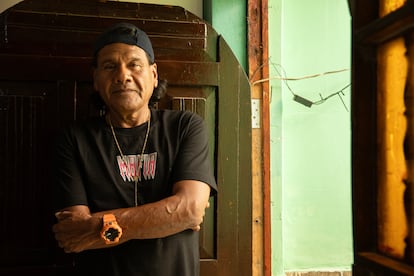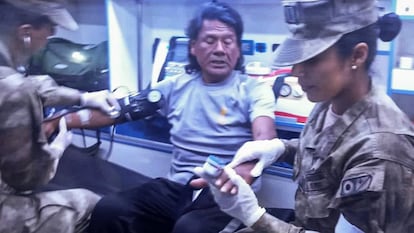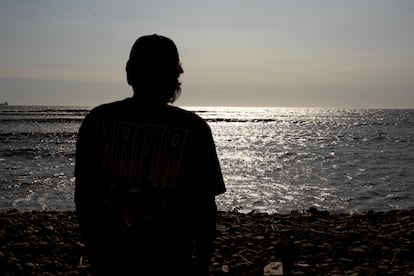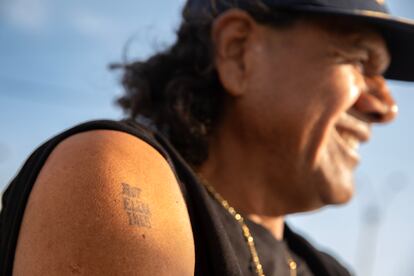Lost at sea: The Peruvian fisherman who survived for 95 days on cockroaches and rainwater
Máximo Napa Castro spent three months alone on his drifting boat, without food or water, before being rescued in the middle of the Pacific Ocean

Máximo Napa Castro had been lost at sea for 70 days, more than 500 miles from the Peruvian coast, when he turned 61, rocking in the solitude of his boat. The 10 cans of tuna, eight kilos of rice, and three kilos of noodles with which he had set sail on December 7 from San Juan de Marcona — a port eight hours from Lima — were now a distant memory. The rumbling of his stomach and the sound of the sea had become a single echo that pounded in his ears. And Máximo, weakened by illness since childhood, swallowed with a dry mouth, steeling himself to do what survival demanded: give in to hunger.
He captured 35 cockroaches hiding on his boat, put them in a jar, and rationed them so he wouldn’t collapse. By then, Máximo Napa, known as Gatón (Cat) — because as a child he cried like a cat — was talking to himself out loud to summon courage and escape his grim reality. “Oh, Gatón, today you’re going to eat grilled chicken. Enjoy,” he would encourage himself, rubbing his hands together after removing the legs, shells, and antennae from the insects, which he ate in one bite. Then, he would open his eyes wide, stare at the nothingness around him, and burst into tears.
Meanwhile, in the city of Pisco, on February 16, his family gathered on his saint’s day to pray to him. They lit missionary candles and placed a photo of Máximo printed on bond paper on an altar of the Virgin of Guadalupe, sprinkling it with holy water. “If he has made a mistake, forgive him. But guide his path, Lord. If he doesn’t know you, make him know you. All will be your will,” said one of his sisters. The Napas, a large family of artisanal fishermen, clung to their faith. In January, they were worried, but it was in February that they formed a prayer chain.
The report of his disappearance only alarmed his family. His daughter, Inés, traveled to Lima every other day to implore the General Directorate of Captaincies and Coast Guards to begin a search, but she claims they never paid attention to the case. Alongside her grandchildren, Máximo’s mother, Elena Castro, soon organized a protest in front of the San Andrés District Municipality in Ica, demanding that the mayor request a helicopter from the Peruvian Air Force. Yet, their cries went unheard. Aside from one regional television channel, his shipwreck hadn’t yet made headlines or been covered in news outlets globally.

On the boat, a three-ton vessel that Máximo christened Gatón after his nickname, the birthday boy could barely stand. He was a bearded man, tanned, exhausted, and dehydrated. But he was fully aware of where he was. First, his engine failed in December and wouldn’t restart; a week later, his satellite radio broke down, but his GPS didn’t stop working. Helplessly, he watched as his boat drifted further away, mile after mile, unable to do anything to stop it.
Máximo Napa Castro had spent Christmas and New Year’s Day in solitude, but he wasn’t prepared to welcome his saint’s day adrift, bobbing among the waves, death looming over him. Amidst his deep sadness, he remembered that, lacking cake, he had saved a piece of food for the occasion. Amid the despair, he remembered that, lacking a cake, he had saved a piece of food for the occasion — a round, salty cookie he ate slowly as though it were the last meal life would offer him. Then, he turned on his solar-powered cell phone, found a photo of his mother, kissed it, and sang “Happy Birthday” to himself.
Writer Patricia Suárez says that human beings survive to tell others that the battle for life is worth it. A survivor doesn’t choose suffering to become an overnight celebrity, instead, they choose to bear witness. Enduring 95 days at sea without food or water, as Máximo Napa Castro did, evokes awe similar to those who have defied death after lightning strikes, falls from cliffs, or plane crashes. All of them require immense luck, or perhaps divine intervention, to continue existing. But the difference in Máximo’s case is that it took more than three months for help to find him.
It’s a weekday in Pisco, in Máximo Napa’s neighborhood, on España Street, just a couple of blocks from the beach. The fisherman was finally rescued on March 11 by an Ecuadorian tuna fishing boat at mile marker 558, in international waters. A helicopter spotted a dead turtle on a small boat and, upon approaching, discovered a naked, emaciated man, his mouth stained with blood.
“I was already dying and fighting with God. The day before, I told him: ‘I don’t want to argue with you anymore, because I know you’re going to send me a helicopter or a plane.’ At five in the afternoon, a turtle attached itself to the boat, and with all my strength, I flipped it over, cut its jugular vein, and drank its blood. An hour later, the helicopter appeared,” says this fisherman, wearing a gold necklace, with his extremely thin legs poking out of brightly colored shorts, as he sits in his living room. He is with his son, Dany, who sang salsa and cumbia songs at his homecoming party.

Then, something supernatural happened. Napa says he was shocked when he saw the co-pilot’s face. “Next to his cheek was Jesus. I saw him clearly. I despaired and started screaming: ‘You did it, you did it,‘” he says, squinting, reliving the moment.
Before setting sail in December, Máximo Napa weighed over 90 kilos. Today he’s close to 70. But he says he’s not worried because after undergoing several tests, his levels are within the normal range — even though he had drunk hydrogen peroxide, rainwater, and eaten birds, turtles, and cockroaches.
His mother, Elena Castro, whose name is tattooed on his right shoulder — along with the names of his daughters — is resting. She was his main motivation for setting out to sea in search of treasure: flying fish roe, a delicacy so prized by the Japanese that they are willing to pay up to 100,000 soles ($270,000) for two tons. He had collected seven sacks when his engine broke down. He had to throw them into the sea. With his earnings, Máximo Napa was going to pay for an eyelid lift for his mother, who had recently suffered paralysis.
“I cried out to God: ‘Why are you doing this to me? Okay, I’m a human being with flaws. I’ve been a womanizer and I’ve mocked women. But I’ve never been bad. All my life, I’ve helped people. Now that I’ve reached land, what am I going to give my mom?’ I admit it: I prayed for my boat to turn over. I even grabbed a knife three times. But then I repented and kept fighting. Now I want to surrender myself to the word of the Lord,” he says. The man who never lost his faith didn’t go to mass. He didn’t carry a Bible or a rosary on the boat. But since his rescue, he has been blessing his food.
Máximo Napa is predestined. Not only does he possess the eloquence needed to be the great narrator of his own story, but his names seem to have chartered a path for him. “Máximo” means the upper or extreme limit to which something can reach. And “Napa” means a layer of underground water. Water was precisely what caused him the most distress. When it stopped raining, he moistened his lips with a soda cap.

Without his boat, his only source of income, Máximo Napa has received financial support from the fishermen’s union. But he’s still not at peace. He has unresolved matters with his two youngest children, who live in Santa Catarina, Brazil. He hasn’t seen them for 17 years. The youngest, Elena, has just made him a grandfather for the 12th time. “I feel ashamed. I don’t have a single penny. Hopefully I’ll receive help to fulfill my wish of meeting my granddaughter Thaína. I no longer want to put things off, because life is now,” he reflects with the wisdom of someone who has cheated death. The sea, despite its lashings, always kept him afloat. The inexplicable has given him a second chance, and now, grateful, he says amen.
Sign up for our weekly newsletter to get more English-language news coverage from EL PAÍS USA Edition
Tu suscripción se está usando en otro dispositivo
¿Quieres añadir otro usuario a tu suscripción?
Si continúas leyendo en este dispositivo, no se podrá leer en el otro.
FlechaTu suscripción se está usando en otro dispositivo y solo puedes acceder a EL PAÍS desde un dispositivo a la vez.
Si quieres compartir tu cuenta, cambia tu suscripción a la modalidad Premium, así podrás añadir otro usuario. Cada uno accederá con su propia cuenta de email, lo que os permitirá personalizar vuestra experiencia en EL PAÍS.
¿Tienes una suscripción de empresa? Accede aquí para contratar más cuentas.
En el caso de no saber quién está usando tu cuenta, te recomendamos cambiar tu contraseña aquí.
Si decides continuar compartiendo tu cuenta, este mensaje se mostrará en tu dispositivo y en el de la otra persona que está usando tu cuenta de forma indefinida, afectando a tu experiencia de lectura. Puedes consultar aquí los términos y condiciones de la suscripción digital.









































